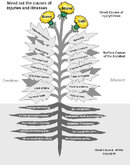OK. Time for someone with absolutely no business responding to this thread thinking he has something to say/add:
As a recently certified diver (little over a year) and was certified along with my 13 year old son, I read a lot to find areas where I can reduce the chance of an accident or learn to respond appropriately. Pete's "State of..." letter and the responses following seem to me to fall into a trap. What was
THE cause or maybe more accurately it identifies surface causes but not root causes. As a professional in safety and hired for accident investigation and expert witness I think it would be very interesting if we all individually looked for root
causes NOT cause.
Remember the 5 why's
How about this:

Think about how many preventive actions we could come up with.
Some starters:
1) Why the DSD program - to get more people the chance to try out SCUBA
2) Why do we want more people in SCUBA - To grow a business
3) Why do you want to grow a business - to make money
4) why do you want to make money - So I can support my family
5) Why do you want to support your family - It was a promise I made to them (and so on....)
Now let's try this one (I'm making this up as I go along, but you get the point)
1) why did the young man have 30# of lead - To make sure he did not bounce up
2) why would he bounce up - he might not know how to manage the air changes as depth changes
3) Why would he not know how to manage the air as depth changes - It is not taught in depth during a DSD
4) why is it not taught in detail during DSD - We don't have a lot of time to cover everything in DSD
5) why don't you have enough time to cover all topics in DSD - it is designed as a one day event (and so on)
How about:
1) why did you lie on the medical questionnaire? - Becuase we thought my son would be OK
2) why did you think your son would be OK? - We did not understand the true risks of his condition while diving
3) why did you not know the true risks of his condition while diving - No one told us
4) why did no one tell you? - We did not ask
5) why did you not ask? I don't know
Or.....
1) Why is the current standard for DSD 1:4 maximum - Experience has shown that was an acceptable risk
2) Why was that determined an acceptable risk - We have not had any accidents to date
(just making that up for arguments sake)
3) Why have you had no accidents to date? - Our instructors are trained to evaluate and manage risks while diving
4) why are they trained to evaluate and manage risks while diving? - To prevent accidents
5) Why do you want to prevent accidents? - Do I really need to go further???
This was really just meant as a mind exercise for all to consider. Imagine all the root causes of this terrible accident. Some direct and some proximate.
The real question and probably answer for the "State of Diving" is how can we affect the
corrective and
preventive actions to help ensure something like this never happens again.




